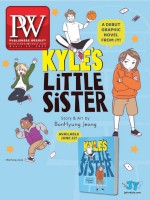Ollman’s Fictional Father (May, Drawn & Quarterly.), follows Caleb, the frustrated grown son of a popular cartoonist whose daily strip, Sonny Side Up, depicts the loving relationship the two of them never had.
How did you create the comic-strip world of Sonny Side Up?
I was going to get another cartoonist to actually draw the strips, but then I was just like, “Ah, I’m gonna do them.” I soaked them in coffee and stuff and tried to make them look aged. It was fun.
Cal gets an ego boost from social media and is also misled by it. What’s your own relationship to social media?
I don’t think I’m the right age to do it properly, so I do it half-assedly. When I started writing this, it was going to be more about an actual working cartoonist who is obsessed with how many likes he gets on Twitter. There are young cartoonists who have lots of followers on Instagram and it works for them. I’m, like, posting pictures of bagels I make.
Cal is drawn very much like you. Where’s the blurry line?
I always draw an avatar of myself in my books. As an ex-Catholic, I’m drawn to confessional stuff. He’s an ex-boozer. I was a bit of a boozer myself. It’s fraudulent in a way, because I didn’t go through a 12-step program, I just quit drinking one day and white-knuckled it.
How did you go about creating the secondary characters?
In one of the reviews of one of my other books, the reviewer wrote that the wife character was like a ghost. A good critique sticks with you. I was trying to make more believable, well-rounded characters. They’re not just there as setups to punch lines.
Cal has a revelation about Sonny Side Up and his father; is it like how everyone has that realization at some point that their parents are human?
His dad has this surface-level charm and not much else, and he’s a hard person to connect to, but there’s a part when Cal says he doesn’t have daddy issues and I realized, “Jesus Christ, his boyfriend has the same name as his dad.” I’m not always thinking these things through ahead of time.
When I was a teenager, my dad and I got along terribly, but as I got older, I understood him better. Before he died, I would come from Montreal to visit, and one night he grabs me by the shoulder and says, “Hey, if we never see each other again, we said everything we need to say, right?” I’m like, “Yeah, sure, are you okay?” And he says, “Yeah, good night!”



 Volume 268
Issue 15
04/12/2021
Volume 268
Issue 15
04/12/2021





